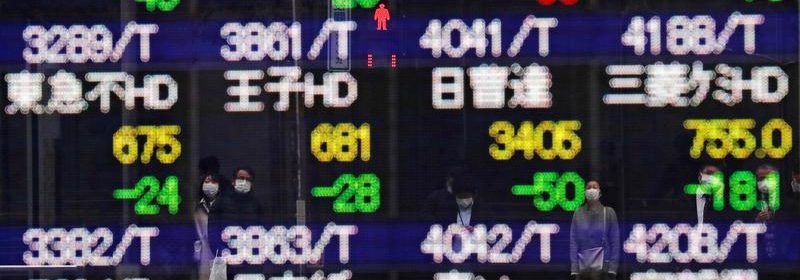Asian stocks fall as rising bond yields impact shares

SYDNEY/NEW YORK (Reuters) – Asian stocks were lower on Tuesday as rising bond yields impacted tech shares and company valuations in China and Korea and investors grappled with their inflation fears as the United States looks set to pass a $1.9 trillion stimulus package.
MSCI’s broadest index of Asia-Pacific shares outside Japan was 0.79% lower while Korea’s Kospi fell by 1.88%, its fourth straight session of losses. Japan’s Nikkei pared back earlier losses in the session to be 0.24% higher.
U.S. Treasury Secretary Janet Yellen said on Monday that President Joe Biden’s coronavirus aid package would provide enough resources to fuel a “very strong” U.S. economic recovery, and noted “there are tools” to deal with inflation.
Despite the positive cues, investors remain conflicted over whether the stimulus will help global growth rebound faster from the COVID-19 downturn or cause the world’s biggest economy to overheat and lead to runaway inflation.
“The chance of our seeing more inflation in the economy is meaningfully increased by the monetary policy actions and the fiscal policy actions that we’re seeing around the world,” Goldman Sachs Chief Executive Officer David Solomon told a conference in Sydney via webcast.
“There is certainly a reasonable outcome where inflation accelerates more quickly than people are expecting, and that will obviously have an impact on markets and volatility.”
The technology sector and other richly valued companies have been highly susceptible to the rising rates.
Australian shares tracked overnight gains on Wall Street with the main S&P/ASX 200 index climbing as much as 1.04% on Tuesday. However, Australian tech stocks slid for the sixth straight session in line with their U.S. peers.
The index gave back those gains to be only 0.40% higher in afternoon trading following the tech declines and a 10% fall in Insurance Australia Group shares ahead of an announcement regarding the insolvency of financial services provider Greensill Capital.
China’s blue-chips were 1% lower while Hong Kong’s Hang Seng advanced 0.9%.
On Wall Street, the Dow advanced while the Nasdaq shed over 2%, marking a more than 10% fall since its Feb. 12 closing high and confirming a correction in the index’s value.
The Dow Jones Industrial Average rose 0.97%, the S&P 500 lost 0.54%, and the Nasdaq Composite dropped 2.41%.
The pan-European STOXX 600 index .STOXX rose 2.10% and MSCI’s gauge of stocks across the globe shed 0.02%.
“If rates are grinding higher because people are getting optimistic about what economic growth looks like, that is still supportive for equity prices,” said Tom Hainlin, global investment strategist at U.S. Bank Wealth Management’s Ascent Private Wealth Group in Minneapolis.
U.S. treasury yields advanced as investors continued to price in higher inflation and more upbeat prospects for the U.S. economy as it emerges from the coronavirus pandemic.
The benchmark 10-year yield rose to 1.6029%, from 1.594% late on Monday.
On foreign exchange markets, the dollar index hit a three-and-a-half month high, rising 0.523%, with the euro up 0.06% to $1.185.
Oil prices were higher on Tuesday, but failed to recoup the gains on Monday after attacks on oil facilities in Saudi Arabia lifted prices to the highest since the COVID-19 pandemic began.
Brent crude futures were up 33 cents, or 0.51%, at $68.57 per barrel. U.S. crude futures were 27 cents, or 0.42% higher at $65.32.
Spot gold added 0.4% to $1,688.42 an ounce.
Source: Read Full Article
